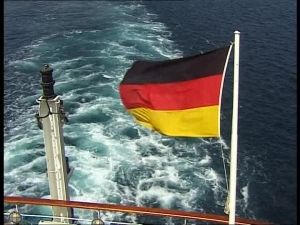


(Posted on 23/11/20)
The member states of the International Maritime Organisation (IMO) have taken a further decisive step towards implementing the IMO climate protection targets for ships worldwide. The IMO’s Marine Environment Protection Committee (MEPC) adopted specific short-term measures for ships to reduce CO2 emissions. “This far-reaching resolution represents substantial progress regarding the contribution by shipping towards combating climate change,” said Ralf Nagel, CEO of the German Shipowners’ Association (Verband Deutscher Reeder, VDR): “Global shipping therefore remains consistently committed to achieving the goal of climate protection.”
The measures at the MEPC meeting were adopted in line with the short-term IMO target calling for ships to reduce their CO2 emissions measured by transport work and compared to 2008 by at least 40 per cent as early as 2030. They are scheduled to apply as of 2023 and, explained in simplified terms, will have technical as well as operational ramifications for over 50,000 maritime vessels currently in service worldwide – i.e. not only for new units or those under construction or planned.
According to the new EEXI (Energy Efficiency Existing Ship Index), all ships are required to conform to efficiency standards across the globe. To do so, they will need to implement mandatory technical measures in order to lower their CO2 emissions to an extensive degree. Similar requirements have already been in place for newbuilds since 2013. The EEXI now requires nearly the entire global merchant fleet in service to become up to 50% more efficient, depending on ship types, from 2023 on (measured by the current fleet status).
In addition, ships will also need to be operated in line with binding CO2 emission reduction targets in future. To this end, each ship will receive an assessment of its carbon intensity, classified into five categories from A to E, similar to household appliances. This Carbon Intensity Indicator (CII) stipulates that for ships that have been assessed only as D- or E-compliant for three consecutive years, a mandatory plan will need to be created with the aim of realising extensive CO2 savings. “The pressure involved in being on the market with the most efficient ships is being considerably intensified by the CII since it creates transparency for all market participants,” noted Nagel. He added that these market dynamics were underestimated by critics of the resolutions: “Let’s face it: who still buys a technical device in a poor efficiency class nowadays?
In addition to the short-term target until 2030, in the long run the maritime shipping sector had already committed itself via the IMO in 2018 to at least halve its global CO2 emissions in absolute terms by the middle of this century. According to a recently published IMO report, the share of total CO2 emissions accounted for by shipping worldwide amounted to about two per cent as of 2018. Despite a 40 per cent increase in global maritime trade and the fact that the world’s maritime shipping fleet tonnage more than doubled between 2008 and 2018, CO2 emissions decreased by ten per cent in the same period because IMO resolutions already enabled ships to sail considerably more efficiently and with lower emissions within this decade.
Torvald Klaveness has announced the decision to consolidate all digital services under Klaveness Digital... Read more
The International Association of Dry Cargo Shipowners (INTERCARGO) has renewed its call for straightforward... Read more
The Swedish Club has delivered strong results for 2024, posting a USD 34 million profit and significantly... Read more
In line with NORDEN’s positive long-term outlook for Capesize freight rates, the company have... Read more
OrbitMI, a global provider of maritime software and data products, has expanded its workflow capabilities... Read more
Current ClassNK Senior Vice President Hayato Suga has been appointed as President & CEO as well... Read more
The surge in demand for Cape Size bulk carriers will continue for another six weeks, driven on by increased... Read more
OrbitMI, a leading provider of maritime SaaS software, has announced that Istanbul-based Statu Shipping... Read more
“The International Association of Dry Cargo Shipowners (INTERCARGO) is deeply saddened by the... Read more
As the shipping industry continues its transition to carbon-neutral fuels, ammonia and hydrogen are... Read more